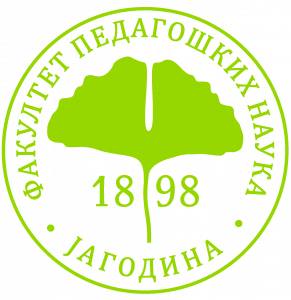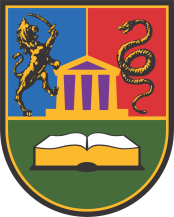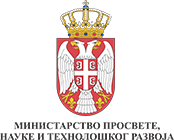STEM/STEAM/STREAM
STEM/STEAM/STREAM Approach in Theory and Practice of Contemporary Education
Јагодина 31.мај 2024. године
stream.fpnj@gmail.com
The Faculty of Education in Jagodina, University of Kragujevac, organizes an international conference called STEM/STEAM/STREAM approach in the theory and practice of contemporary education. The goal is for the participants to present and critically consider the results of the latest theoretical and empirical research in the field of STEM/STEAM/STREAM approaches in/to education.
STEM is an integrated educational approach to learning and teaching, which requires an intentional connection between curriculum learning objectives, standards, assessments, and lesson design/implementation. As a response to the changing workforce demands of modern society, there is an increasing focus on the role of the arts in STEM and creating, implementing, and exploring STEAM (science, technology, engineering, arts, and mathematics) programs. Including the arts in STEM learning enhances teaching and student achievement, inquiry and problem-solving skills, and creative thinking, raises students’ interest in science and its application and provides multiple access points for students to engage in the creative process and meet objectives in all subject areas (Dell’ Erba, 2019; Psycharis, 2018; Kim et al., 2013). STEAM skills such as computational thinking, problem-finding and solving, creativity, and innovation are crucial for people working to manufacture smarter products and improve different domains of human life. Students with strong academic achievement in STEAM are more likely to find jobs and earn higher wages and career opportunities related to STEAM have grown three times as fast over the last decade compared to jobs in other fields (U.S. Department of Commerce, 2011).
As the aforementioned interdisciplinary concept provides numerous opportunities for improvement and further expansion, the leading idea of the conference is to make a breakthrough in the aforementioned concept through the STREAM model, which removes the traditional boundaries between language (Reading) and other disciplines (science, technology, language, engineering, art and mathematics) and integrates them into real-world, student-relevant learning experiences. This approach offers students the opportunity to apply what they have learned in a real-world context, enhancing their language skills and helping them develop competencies for a rapidly changing world. Each of the STREAM disciplines in the learning experience incorporates a set of different skills, including critical thinking and problem-solving, the use of information and digital tools, literacy and communication skills, creativity and self-expression, mathematical reasoning and analysis, and more. Current demands require lifelong learning and continuous improvement, so it is essential to empower students to connect knowledge from various fields into a functional whole, enabling them to solve a wide range of personal, professional, social, and other problems.
The conference covers, but is not limited to, the following topics:
- Challenges and perspectives of the STEM/STEAM/STREAM approach in the theory and practice of contemporary education
- The Role of STEM/STEAM/STREAM Approach in Changing the Perception of Formal Education.
- The role of the STEM/STEAM/STREAM approach in developing competencies for the 21st century
- STEM/STEAM/STREAM approach and curricula of modern upbringing and education
- STEM/STEAM/STREAM approach and modern learning and teaching models
- The effects of the STEM/STEAM/STREAM approach in contemporary education
- Methodological challenges in designing STEM/STEAM/STREAM materials for learning and teaching
- Evaluation in the STEM/STEAM/STREAM approach
- Professional development and competencies of educators for the STEM/STEAM/STREAM approach
- Students’ personality and their educational needs within the STEM/STEAM/STREAM approach
Programme board:
Stephane Brunel, Faculty of Education, Orleans University, France.
Zina Maria Morbach, Philipps University in Marburg, Germany.
Snezana Lawrence, Middlesex University, London, UK.
Sandra Kadum, Faculty of Education, University Jurja Dobrile in Pula, Croatia.
Malgorzata Cichon, University of Adam Mickiewicz, Poznan, Poland.
Alkiviadis Tsimpiris, Department of Computer, Informatics and Telecommunications Engineering, International Hellenic University, Greece.
Jurka Lepičnik Vodopivec, Faculty of Education, University of Primorska in Koper, Slovenia.
Dušan Ristanović, Faculty of Education, University of Kragujevac, Jagodina.
Sanja Blagdanić, Faculty of Education, University of Belgrade.
Katarina Putica, Faculty of Chemistry, Innovative Centre, Department of Chemistry, Belgrade.
Miloš Đorđević, Faculty of Education, University of Kragujevac, Jagodina.
Aleksandar Ignjatović, Faculty of Education, University of Kragujevac, Jagodina.
Aleksandra Mihajlović, Faculty of Education, University of Kragujevac, Jagodina.
Verica Milutinović, Faculty of Education, University of Kragujevac, Jagodina.
Irena Golubović-Ilić, Faculty of Education, University of Kragujevac, Jagodina.
Nenad Vulović, Faculty of Education, University of Kragujevac, Jagodina.
Nataša Vukićević, Faculty of Education, University of Kragujevac, Jagodina.
Gordana Stepić, Faculty of Education, University of Kragujevac, Jagodina.
Organizational board:
Slađana Stanković, Faculty of Education, University of Kragujevac, Jagodina.
Ivana Ćirković-Miladinović, Faculty of Education, University of Kragujevac, Jagodina.
Marija Stanojević-Veselinović, Faculty of Education, University of Kragujevac, Jagodina.
Jelena Mladenović, Faculty of Education, University of Kragujevac, Jagodina.
Milan Milikić, Faculty of Education, University of Kragujevac, Jagodina.
Milan Komnenović, Faculty of Education, University of Kragujevac, Jagodina.
Nedeljko Milanović, Faculty of Education, University of Kragujevac, Jagodina.
Suzana Đorđević, Faculty of Education, University of Kragujevac, Jagodina.
Jovana Đorđević, Faculty of Education, University of Kragujevac, Jagodina.
Stefan Ljubomirović, Faculty of Education, University of Kragujevac, Jagodina.
Important Dates:
Deadline for Abstract Submission: March 31, 2024.
Notification of Abstract Acceptance: April 20, 2024.
Deadline for Full Paper Submission: May 31, 2024.
Conference Date: May 31, 2024.
Notification of Paper Acceptance: September 1, 2024.
The working languages of the Conference are Serbian and English.
Registration and payment:
Application form: https://forms.gle/MRgdJXDSAQpfHHjW7
For more information, please contact us at stream.fpnj@gmail.com
At the conference, you will have the option to present either in person at the Faculty’s premises or online via the ZOOM application. Presentation time is 15 minutes, followed by a discussion lasting 5 minutes.



